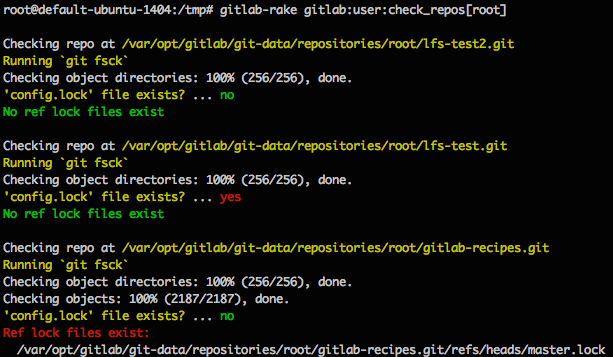4.3 KiB
Check Rake Tasks
Repository Integrity
Even though Git is very resilient and tries to prevent data integrity issues, there are times when things go wrong. The following Rake tasks intend to help GitLab administrators diagnose problem repositories so they can be fixed.
There are 3 things that are checked to determine integrity.
- Git repository file system check (git fsck). This step verifies the connectivity and validity of objects in the repository.
- Check for
config.lockin the repository directory. - Check for any branch/references lock files in
refs/heads.
It's important to note that the existence of config.lock or reference locks
alone do not necessarily indicate a problem. Lock files are routinely created
and removed as Git and GitLab perform operations on the repository. They serve
to prevent data integrity issues. However, if a Git operation is interrupted these
locks may not be cleaned up properly.
The following symptoms may indicate a problem with repository integrity. If users experience these symptoms you may use the rake tasks described below to determine exactly which repositories are causing the trouble.
- Receiving an error when trying to push code -
remote: error: cannot lock ref - A 500 error when viewing the GitLab dashboard or when accessing a specific project.
Check all GitLab repositories
Note:
gitlab:repo:checkhas been deprecated in favor ofgitlab:git:fsck- Deprecated in GitLab 10.4.
gitlab:repo:checkwill be removed in the future. Removal issue
This task loops through all repositories on the GitLab server and runs the 3 integrity checks described previously.
Omnibus Installation
sudo gitlab-rake gitlab:git:fsck
Source Installation
sudo -u git -H bundle exec rake gitlab:git:fsck RAILS_ENV=production
Check repositories for a specific user
This task checks all repositories that a specific user has access to. This is important because sometimes you know which user is experiencing trouble but you don't know which project might be the cause.
If the rake task is executed without brackets at the end, you will be prompted to enter a username.
Omnibus Installation
sudo gitlab-rake gitlab:user:check_repos
sudo gitlab-rake gitlab:user:check_repos[<username>]
Source Installation
sudo -u git -H bundle exec rake gitlab:user:check_repos RAILS_ENV=production
sudo -u git -H bundle exec rake gitlab:user:check_repos[<username>] RAILS_ENV=production
Example output:
Uploaded Files Integrity
Various types of file can be uploaded to a GitLab installation by users. Checksums are generated and stored in the database upon upload, and integrity checks using those checksums can be run. These checks also detect missing files.
Currently, integrity checks are supported for the following types of file:
- LFS objects
- User uploads
Omnibus Installation
sudo gitlab-rake gitlab:lfs:check
sudo gitlab-rake gitlab:uploads:check
Source Installation
sudo -u git -H bundle exec rake gitlab:lfs:check RAILS_ENV=production
sudo -u git -H bundle exec rake gitlab:uploads:check RAILS_ENV=production
These tasks also accept some environment variables which you can use to override certain values:
| Variable | Type | Description |
|---|---|---|
BATCH |
integer | Specifies the size of the batch. Defaults to 200. |
ID_FROM |
integer | Specifies the ID to start from, inclusive of the value. |
ID_TO |
integer | Specifies the ID value to end at, inclusive of the value. |
VERBOSE |
boolean | Causes failures to be listed individually, rather than being summarized. |
sudo gitlab-rake gitlab:lfs:check BATCH=100 ID_FROM=50 ID_TO=250
sudo gitlab-rake gitlab:uploads:check BATCH=100 ID_FROM=50 ID_TO=250
LDAP Check
The LDAP check Rake task will test the bind_dn and password credentials
(if configured) and will list a sample of LDAP users. This task is also
executed as part of the gitlab:check task, but can run independently.
See LDAP Rake Tasks - LDAP Check for details.
